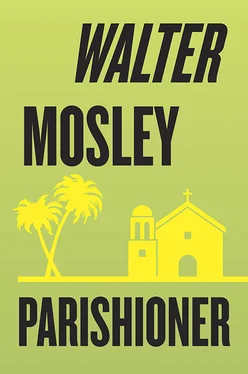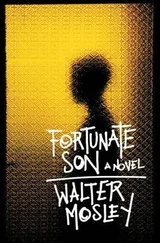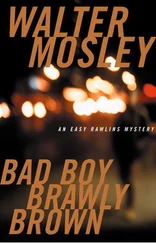Walter Mosley - Parishioner
Здесь есть возможность читать онлайн «Walter Mosley - Parishioner» весь текст электронной книги совершенно бесплатно (целиком полную версию без сокращений). В некоторых случаях можно слушать аудио, скачать через торрент в формате fb2 и присутствует краткое содержание. Год выпуска: 2012, ISBN: 2012, Издательство: Knopf Doubleday Publishing Group, Жанр: Криминальный детектив, на английском языке. Описание произведения, (предисловие) а так же отзывы посетителей доступны на портале библиотеки ЛибКат.
- Название:Parishioner
- Автор:
- Издательство:Knopf Doubleday Publishing Group
- Жанр:
- Год:2012
- ISBN:978-0-345-80444-0
- Рейтинг книги:4 / 5. Голосов: 1
-
Избранное:Добавить в избранное
- Отзывы:
-
Ваша оценка:
- 80
- 1
- 2
- 3
- 4
- 5
Parishioner: краткое содержание, описание и аннотация
Предлагаем к чтению аннотацию, описание, краткое содержание или предисловие (зависит от того, что написал сам автор книги «Parishioner»). Если вы не нашли необходимую информацию о книге — напишите в комментариях, мы постараемся отыскать её.
Parishioner — читать онлайн бесплатно полную книгу (весь текст) целиком
Ниже представлен текст книги, разбитый по страницам. Система сохранения места последней прочитанной страницы, позволяет с удобством читать онлайн бесплатно книгу «Parishioner», без необходимости каждый раз заново искать на чём Вы остановились. Поставьте закладку, и сможете в любой момент перейти на страницу, на которой закончили чтение.
Интервал:
Закладка:
“I don’t know, Lou. That depends on what you got to say.”
“Maybe,” the detective said. “Maybe Brayton has disposed of the vehicle. Maybe he’s cracked the safe.”
“There’s a trick to the hiding place,” Xavier said, “and if he got rid of the car we’d like to know where he did that, and to whom it went.”
“Whom? You’ve read a book, Mr. Noland.”
“Yeah. Studied my letters in downtime. Now … do you have anything to say to me?”
“I’ve already told your cousin …”
Xavier stood up, pushing the red chair away with the backs of his knees.
“But …” Baer-Bond said hastily. “But I might have abbreviated my report. Who’s to say that I didn’t come across a guy who knew a guy who heard something somewhere? Not enough to give as fact but more like a whisper or a hint.”
“And why would you keep Benol in the dark when she was paying you?”
“The lead didn’t go anywhere. I told your cousin that if she wanted to put me on a retainer I’d nose around. But I think she thought I was trying to play her. So she paid me my three hundred and I put the whole thing out of my mind.”
Xavier was beginning to have fun. He liked sparring with the gray man behind the dented pine desk. It almost felt social.
The Parishioner repositioned the chair, sat down again.
“Okay, Lou, here’s what it is. Benol has had her car stolen by this Brayton guy. There’s some money involved.”
“I don’t remember the particulars of the case off the top of my head,” the fleshy detective said. “There’s not much room in here, and so when I finish with a job I file it in my garage.”
“You could look it over after work,” Ecks suggested.
“And why would I bother?”
“If you can prove to me that you have a lead on him, and if you give me that lead, I will pay you six hundred dollars and you can buy more cigarettes and chili dogs.”
“What kind of lead?”
“You know better than I do, man. Here’s my card. Call me if you think of something.”
Xavier gave the PI a special card imprinted only with his cell phone number.
“There’s no name on this card.”
“You know my name already.”
“I don’t think I’ll have anything for you.”
“If you do there’s six hundred dollars in it.”
The detective pursed his lips, again probably unconsciously.
Marilee Pepper worked the sixth-floor research center at the main branch of the LA Public Library. Sixty years old, she was at the zenith of her abilities by Xavier’s estimation. Tall, six one, and white like antique ivory, she was all the way gray and serious about her work. Xavier had met her while researching jobs in the Los Angeles labor market. That was when he had just arrived in LA; seventy-two hours or so after he and Swan had slaughtered Marquis Bertrand.
“Hello, Mr. Noland,” Marilee said. She even smiled, a little.
“Ms. Pepper.”
“It’s such a beautiful day, isn’t it?”
“Every day is beautiful in paradise.”
They always shared the same words of greeting. It was like the delivery of passwords under cover of darkness during a bloody civil war.
“How can I help you?” the librarian asked.
Xavier didn’t know exactly where the schematics were stored or how to read them if he had. But Ms. Pepper could call up the right blueprints and maps that would reveal the corner where, twenty-three years ago, there was a suspended stoplight that worked at the intersection of two streets, at least one of which was a boulevard, in Culver City.
“How’s Mr. Matthews?” Xavier asked, while Ms. Pepper studied the computer screen on the desk before her.
The severe librarian had a soft spot.
“He had to have an operation.”
“What was wrong?”
“A growth in his abdomen. They said that the only way to tell if it was benign or not was to get it out.”
“How did he do?” the once heartless gangster asked.
Remember kindness and repeat it , Father Frank had preached. It doesn’t matter if it feels unnatural or forced. Goodness sets its own table .
“He’s doing just fine. For the first week he tried like heck to scratch off the bandages but I’d hold him and we finally made it through. It was my first vacation from work in thirty-one years.”
“That calico has nine lives and you are every one.”
Marilee Pepper looked up gratefully. Her hard, white, and oval face was brightened by the glow of the computer screen and sentiment.
“There are four possible intersections,” she said. “Twenty-three years ago four-way signals were in some use. I’ll print out the cross streets.”
“I really appreciate this, Ms. Pepper.”
“As do I,” she replied.
Ecks tried two of the intersections before pulling up to the curb on Lancaster Avenue where it met Kasidis Boulevard.
There was no individual house standing on the corner of the first two cross streets. If the baby trafficker’s home had been at any one of those intersections it was now rubble underneath an ugly, rectangular apartment building.
He sat in his car by the curb wondering about architecture and the way planners named streets in Los Angeles County. Avenue and boulevard were big names for such small side streets. He couldn’t quite make out why there was a stoplight there at all. It must have been, he thought, management for the larger streets and people taking shortcuts through the neighborhood. Or maybe a child had been run over and a neighborhood group had pressured the local political machine.
There was very little traffic at that time of day: little traffic, three gaudy apartment buildings, and a solitary house the lawn of which arched from one avenue onto the other boulevard.
The stucco apartment buildings had all been built in the last twenty-three years; Xavier was pretty sure of that. They were cheap but not yet dilapidated, like so much of LA that was not Hollywood, Beverly Hills, or one of the other neighborhoods colonized by the rich and the pretenders to wealth.
The one house was older but dark blue, not brown as Benol had remembered. However, paint was inexpensive and its reapplication necessary under the constant glare of sunlight on the Southern California desert landscape.
Twenty-three years. What was he doing there? Why had Father Frank set him on this path?
The rapping on his window testified to his distraction. Back in the day, in Harlem, no one could have come up on him unawares like that.
The white policeman had tapped the glass with his nightstick.
Xavier smiled out of reflex as the cop moved his hand and fingers in a circular motion, indicating that he wanted the window to come down. The displaced Harlemite complied.
“Afternoon, Officer.”
“Step out of the car, please.”
The pistol was in a hidden pouch under the driver’s seat, and so Xavier felt comfortable getting up and out of his vintage car. To the left stood the young policeman’s partner, a milk chocolate black man with steady eyes and no hint of humor.
“License,” the white cop said.
They stopped him because he was a black man sitting in a parked car at an intersection where he obviously did not belong. Once he emerged there was even more fuel for their suspicions-much more. The brown shirt and lime suit were bad enough, but his shoes were the color of mottled grapefruits-there were very few professions that wore this uniform, and most of those were illegal.
Xavier handed over his California license and smiled.
The black cop scowled while the white one read.
Rule noticed that there was an angry pimple on the left side of the white policeman’s neck. Half the diameter of a dime, it had a yellowish eye that seemed about to explode.
Читать дальшеИнтервал:
Закладка:
Похожие книги на «Parishioner»
Представляем Вашему вниманию похожие книги на «Parishioner» списком для выбора. Мы отобрали схожую по названию и смыслу литературу в надежде предоставить читателям больше вариантов отыскать новые, интересные, ещё непрочитанные произведения.
Обсуждение, отзывы о книге «Parishioner» и просто собственные мнения читателей. Оставьте ваши комментарии, напишите, что Вы думаете о произведении, его смысле или главных героях. Укажите что конкретно понравилось, а что нет, и почему Вы так считаете.












